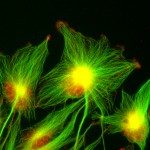Lien vers Pubmed [PMID] – 23875648
Annu. Rev. Cell Dev. Biol. 2013;29:471-99
Migration is a polarized cellular process that opposes a protrusive front edge to a retracting trailing edge. From the front to the rear, actin-mediated forces sequentially promote cell protrusion, adhesion, contraction, and retraction. Over the past decade, microtubules have revealed their pivotal role in cell migration. Through their roles in cell mechanics, intracellular trafficking, and signaling, microtubules participate in all essential events leading to cell migration. The front-rear polarization of microtubule functions relies on the asymmetric regulation of microtubule dynamics and stability; the asymmetric distribution of microtubule-associated protein complexes; and finally, the orientation of the microtubule network along the axis of migration. Microtubule network polarity controls the establishment and maintenance of the spatial and temporal coordination of migration events and is therefore the key to persistent directed migration. This review summarizes our current understanding of the functions of microtubules in persistent cell migration and of the migration-associated signals that promote microtubule network polarization.

